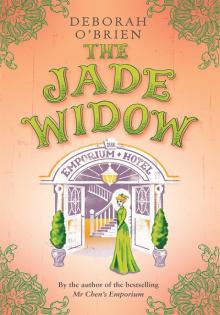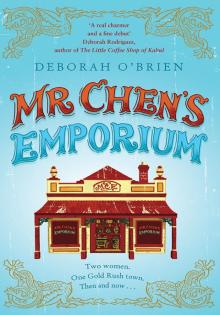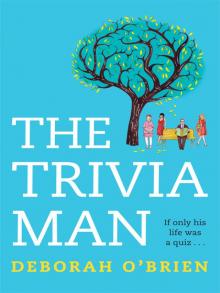- Home
- Deborah O'Brien
A Place of Her Own Page 2
A Place of Her Own Read online
Page 2
Trays of food she’d cooked herself sat on the shelves of the fridge: tiny sausage rolls, little savoury muffins, pizzette, all wearing veils of cling film. In one section the shelves had been removed to accommodate a soaring croquembouche, the perfect celebration cake. For years she’d had mixed success with choux pastry, but yesterday it had worked at the very first attempt. She put the positive result down to the Millbrooke factor. After all, Millbrooke was a place where magical things could happen. A grieving widow, who thought her life was over, could find the path to renewal. A scruffy-looking man in a beanie, whom nobody noticed, could turn out to be one of the most erudite and interesting people she’d ever met. And a rundown, old house that the world had written off could be transformed into a charming home.
Angie checked her watch. It was already noon and her sons would be arriving any minute. Not to mention Vicky and Chrissie, her best friends from Sydney. She dashed upstairs to shower and change. All the bedrooms had their own bathroom now, even her own. It was the smallest of all, but the most charming. From the time Doug Morrison had first shown her through the house, she had known the bedroom with the arched window and little seat underneath was the one she wanted for herself. It had once belonged to a teenage Scottish girl by the name of Amy Duncan, whose father had been the town’s Presbyterian minister during gold rush times.
Over the past eighteen months Amy had come to play an important part in Angie’s life. They were completely different women in terms of age and era, yet they had much in common. The two of them had lost their husbands suddenly – Angie’s to a heart attack, Amy’s to diphtheria at a time when there were no vaccinations. Admittedly, Amy was only a newlywed and Angie had been married for thirty years. But who was to say which situation was worse? The ‘if onlys’ of a marriage never fulfilled or the memories of three decades together? Both were tragedies. Amy had never remarried. Neither would Angie. She had decided that on the day Phil died.
Amy’s husband, Charles Chen, had been the owner of a Chinese emporium, and when he died, Amy had taken over the management of it. She’d also established a fancy hotel, complete with a fairytale turret and the town’s first and only lift. Both buildings still stood side by side and almost untouched in Millbrooke’s main street. Angie’s entrepreneurial efforts could hardly compare in scale with Amy’s. Nevertheless, she had undertaken the restoration of a derelict building and turned it into boutique accommodation, working through a complex tangle of municipal red tape to have her project approved. Sometimes she imagined that Amy would be proud of her.
In a few months the Amy Duncan Chen exhibit would be opening at the Millbrooke Museum. There probably wouldn’t be a big ceremony, not in the manner of the amenities block or Angie’s B&B. Bert, the white-haired president of the historical society, liked to keep things low-key, but no doubt there would be a few celebratory drinks after-hours in the dusty downstairs display area.
An exhibit about Amy’s life had been Angie’s initiative, aided by Richard and her painting class, as well as a significant injection of funding from Songbird Minerals, the American mining company that had aspired to construct a mine on the site of the old goldfields. At the last moment, in the face of local environmental protests and a mooted mining tax, they had lost their nerve and decamped to a more laidback Venezuela together with their cowboy engineer, Jack Parker. Angie’s summer with Jack, a slightly younger man who resembled Clint Eastwood in his heyday, now seemed like a dream rather than a flesh-and-blood relationship.
She hadn’t heard from him since he left for South America via his home in San Francisco. Not a word. Then again, she hadn’t tried to contact him either. There was no unfinished business between them, no need to keep in touch. It had been more than a fling and less than a love affair. Some people lost a partner and took to drink, others had an affair, usually with someone totally inappropriate. Angie had done the latter. As it turned out, the relationship with Jack had helped her see a possible future when she’d thought there was none.
Angie disrobed, turned on the taps and stepped into the shower. A jet of hot water scalded her chest. Instantly she turned the cold tap to maximum, but the scalding continued. She turned off both taps and tried the cold water on its own. Barely a drip.
Cursing, she wrapped herself in a towel and went to the phone beside the bed where she dialled her friend Moira, who always knew what to do in a crisis, even a minor one.
‘Moira, I’ve just scalded myself in the shower. There wasn’t any cold water. Do you think I should call a plumber?’
‘Are you burnt?’
‘A bit red, but I’ll live. I’m more concerned about not having any water.’
‘Let me check my taps.’ She was gone for a minute or two. ‘I don’t have any cold water either.’
‘What do you think has happened?’
‘Just a sec, Angie. I’m going to have a look in the paper.’
While Moira was away from the phone again, Angie checked the damage to her skin. It didn’t look serious.
‘Angie, are you there? There’s a tiny notice right at the bottom of the back page. It says the council is turning off the water from noon today for approximately three hours. They’re doing some repairs to the water treatment plant. They say we should store water to use during that time.’
‘But I have an afternoon tea to organise, and I can’t use water from the hot water service to make tea and coffee. Are they trying to sabotage my launch? Why didn’t they put a note in our letterboxes to warn us, like they do in the city? It’s not as though Millbrooke’s a big place.’
‘Don’t worry. I’ll ring Richard. He has a tank. I’ll get him to fill some water containers to bring down. Just in case.’
‘Tell him to wash them out first, Moira. You know what he’s like.’
Diana Goodmann had been sitting in the Gold Rush Café for an hour, lingering over two cranberry juices. She hadn’t wanted a juice at all. Cappuccino was more her style, but according to the café owner, the council had turned off the water supply and, as a result, there was no tea or coffee. A tourist had just walked out in a huff. From behind the counter she could hear mutterings of ‘What does the council think they’re doing turning off the water on a Saturday? It’s peak tourist time.’
Although the owner didn’t seem anxious for Diana to leave and there were plenty of empty tables, she was feeling restless. She hated being in the one spot for too long. Under the tablecloth her legs were jiggling, telling her it was time to go. She had read the menu two or three times already. There was a blurb recounting the café’s former life as a haunt of bushrangers and shady ladies during the gold rush era. Apparently a gang with an Irish name – not Kelly – had shot one of their own members in this very building and buried him under the floor.
She had also scoured a copy of the local rag, which had been abandoned on the adjoining table, looking for mention of a certain someone from her past, but there was nothing. The front page story was about today’s big event – the opening of the new amenities block. There was no real news in Millbrooke. Never had been; never would be. It was a backwater with pretensions.
Briefly she considered turning up at his door, but that might be crass. Then again, meeting by chance in the street or one of the shops or cafés wasn’t ideal either. She needed to have the upper hand. It was his role to be surprised and hapless.
The town hadn’t changed, not its appearance anyway, although a few of the old buildings had been revamped with brightly painted façades and new signage. Thank goodness. Those faded old signs left over from the nineteenth century saying ‘Haberdashery’ or ‘Mercery’ or ‘Saddlery’ gave the place such a shabby look. While the streetscape remained unchanged, the inhabitants were different. The town was full of blow-ins. But the old guard would still be around, people like Moira, with family histories in Millbrooke stretching back generations, tucked away in their houses on a Saturday, avoiding those damned
tourists with their city ways and bad manners. On any other day, Diana would need to be careful in case one of the diehards recognised her. That cunning old Moira would spot her right away, even though her long dark hair was now short and streaked with glittering blonde highlights. Diana didn’t want anyone alerting the man in question to the fact she was in town. Not before the chance meeting, the fairytale reunion when all would be forgiven.
Diana knew, from the way men looked at her and the accompanying frowns on their wives’ faces, that she was still attractive. But just to be sure, she’d had some work done recently – nothing major. An injection of filler here and there, an anti-wrinkle treatment and a chemical peel. The cosmetic dermatologist had promised her she would look thirty-five. She’d replied that forty would do. But her neck was the giveaway. There were crease lines she had to conceal with a glamorous chiffon scarf. All the same, with her tight-fitting shirt and even tighter jeans, she looked pretty good for a woman of a certain age.
2 THE LAUNCH
Moira arrived first with a ginger sponge cake. Then the rest of Angie’s painting ladies followed, carrying platters and trays. Angie smiled to herself as she thanked them. It was true about country people being good-hearted. Next Richard turned up in his ute with a collection of water containers. Ironically, Millbrooke’s water supply had been restored in the last half hour.
‘Surely that’s not Richard Scott,’ said Jennie, giving Narelle a nudge.
‘He must have been on one of those makeover shows,’ Narelle replied. ‘Not exactly Clark Kent to Superman, but at least he doesn’t look like a street person any more.’
‘Yeah, he scrubs up rather well.’
‘I always thought he was a bit of a dero, but he might be worth pursuing. He’s got plenty of money, hasn’t he?’
‘None of your business.’ Jennie was the town’s accountant and admirably discreet when it came to professional matters.
Narelle’s gaze continued to follow Richard as he headed across the yard towards the pergola.
‘Leave him alone, Narelle,’ said Jennie sternly.
‘It’s all very well for you, Jen. You have Mark. But what about me?’
‘Richard’s far too old for you. And anyway, I think he might have a crush on our Angie.’
Angie, who was arranging canapés on a tray, had overheard their entire conversation but was too embarrassed to offer a retort.
‘I just heard on the radio that the water’s back on,’ said Richard as they met at the back door, ‘so I left the containers in the ute.’
‘Thanks anyway, Richard. I was in a real panic.’
‘Moira told me you burnt yourself. Would you like me to have a look?’
From any other man, that question would have sounded decidedly seedy. Even Richard must have been aware of the connotations because he added: ‘I have an advanced first aid certificate.’
‘No thanks. It’s just a bit pink, like a mild case of sunburn.’
‘Well, make sure you go to the hospital if it gets worse.’
It was nice to have someone worry about her. Angie gave him a sideways glance. He looked quite spiffy in his beige suede jacket. She wondered if he’d bought it for the occasion.
Except for the mayor and a few of his cronies on the chamber of commerce, most of Angie’s invitees had turned up at the Manse, including the entire committee of the tourism association. Apparently people were boycotting the opening of the amenities block as a protest against the council’s incompetence.
‘When is the state government going to look into Millbrooke Shire Council?’ asked Narelle.
‘If there was any corruption, I’m sure we would have heard whispers by now,’ said Richard, holding a glass of orange juice in one hand and a sausage roll in the other. ‘I suspect they’re simply inept.’
‘Well, whichever it is,’ said Moira, ‘I’d like to know what’s happened to all that money we’ve paid out in rates. Surely we should be seeing something more for our contributions than a new amenities block.’
‘Cui bono?’ said Richard. ‘Who benefits?’
‘The tourists passing through town,’ answered Narelle. ‘They’re the ones who benefit from something like this.’
‘You’re right about that,’ said Jennie. ‘Anyway, I wouldn’t use a public toilet if you paid me.’
‘Cui bono?’ repeated Angie. ‘Wasn’t that Cicero?’
‘No,’ replied Richard, ‘it was Cassius.’
‘I don’t think so,’ countered Angie. ‘I’m certain it was Cicero.’
‘He was quoting Cassius,’ said Richard.
Around them, the crowd was scattering in the direction of more interesting conversations.
‘Let’s agree to disagree,’ said Angie.
‘No, I’ll look it up as soon as I get home this afternoon,’ he said.
Angie indulged in a secret smile. She hoped she was right. It was always such a satisfying feeling to trump Richard Scott.
In between passing trays of food around, Angie took small groups on tours of the house. Proudly she announced that her first guests were arriving later that afternoon – a couple from Melbourne and a woman from the coast. Everyone sighed in admiration at her interior decoration and all the extra touches.
‘Feel the towels,’ whispered Jennie to Narelle.
‘Egyptian cotton, and they’re bath sheets, not towels,’ hissed Narelle.
The members of the tourism association were particularly taken with the neat containers of brochures on the hallstand and the collection of coffee-table books about Millbrooke in the sitting room. Everyone commented on the portrait hanging over the mantel. It was Angie’s painting of Amy Chen.
Even Nola, the proprietor of the Old Schoolhouse B&B, gave Angie a positive wrap:
‘You’ve done a good job, Angie. We needed extra accommodation in this town. I’m always turning people away. Now I have a reasonably priced place I can recommend without hesitation.’ She lowered her voice. ‘I don’t like sending them to the motel.’
Angie knew the town’s only motel wasn’t anything special. Jack Parker had stayed there before he came to lodge with her.
After Angie had shown her guests over the house, they assembled under the new pergola to hear Richard’s speech. As if on cue, the alpacas gathered at the edge of the paddock. They knew Richard well, having been his gift to Angie from his own herd.
‘Angie Wallace has asked me to say a few words to launch her new venture. As most of you know, Angie is technically what we townspeople call a blow-in. She only came to Millbrooke eighteen months ago, and you don’t count as an official Millbrooker until you’ve lived here for much longer than that. But Angie’s different. She was a Millbrooker from the start. I met her the first time she visited our town. It was a weekend away with her good friends, Vicky and Chrissie, who’ve come all the way from Sydney to be here today. So have her sons, Blake and Tim.’
As he indicated the two women and the boys, there was polite applause.
‘That weekend, when Angie turned up to inquire about the Manse, she didn’t want to buy it, so we came to an arrangement whereby she would lease it for a year and then see how she felt. I don’t need to tell you what happened after that. But it’s hard to imagine Millbrooke without Angie Wallace, isn’t it?’ There was more applause and even a whistle from Narelle.
‘Angie is the kind of person who inspires loyalty, a person who collects friends, but not just for the sake of it. She cares about them. She takes them into her heart. Just ask her painting ladies. That’s why Angie will be such a fine proprietor of this B&B. She has a gift for making people feel welcome and cherished. And you all know what a good organiser she is. First the art show and soon the Amy Chen display at the museum. Angie was the instigator of both. She’s a great asset to this community. Not simply because she’s restored a derelict old building and turned it
into a showpiece, but because she cares about the fabric of this town. She appreciates its history, she seeks out its past, she loves Millbrooke as much as anyone here today.
‘And so, if your glasses are charged, let me make a toast. I commend Angie Wallace to you and her charming new B&B. May it be a great success. To Angie.’
As Richard raised his glass of orange juice and looked directly at her, Angie blinked away tears. Blake and Tim hugged her. Then she realised that people expected her to say something in response. She cleared her throat and wiped furtively at her eyes.
‘Thank you, Richard. I really don’t know what to say, except that Millbrooke has brought me renewal when I had given up hope of feeling anything but despair. And by Millbrooke, I mean all of you. Thank you for your friendship and support over the last year and a half. To Richard, who has been my rock, to Moira and my Wednesday painting class for making me laugh when I felt like crying, to Bert at the museum, who was infinitely patient whenever I pestered him for information about Amy. To all the tradies who worked on the house. To my dear friends, Vicky and Chrissie, and, of course, to the most important people in my world, Blake and Tim. And to everyone here today, your good wishes will sustain me.’
As she heard the applause, she was afraid to meet Richard Scott’s eyes. She had called him her ‘rock’. Where had that come from? It had slipped out before she could stop it.
With the three bedrooms at the Manse occupied, Angie had a problem accommodating her Sydney visitors. The boys offered to sleep in the barn, but it still meant Vicky and Chrissie would have to sleep on sofa beds.
‘You have enough to do with your paying guests arriving today. We’ll stay with Nola,’ said Vicky in a tone suggesting there would be no arguments entered into.
At five o’clock on the dot the Melbourne couple arrived in a white four-wheel drive. Angie offered them coffee and chocolate mint slice. They complimented her on the country hospitality. What the elderly pair didn’t know was that for most of her life she’d been a city person, just like them.

 A Place of Her Own
A Place of Her Own The Jade Widow
The Jade Widow Mr Chen's Emporium
Mr Chen's Emporium The Trivia Man
The Trivia Man